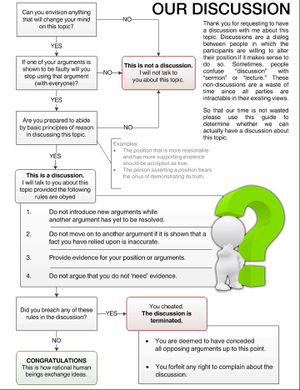Difference between revisions of "Issuepedia:Arguing"
(refinement of key policy on opinions) |
(link -- another set of guidelines) |
||
| Line 61: | Line 61: | ||
** In other words, you don't need to have your evidence together in order to challenge an assertion. | ** In other words, you don't need to have your evidence together in order to challenge an assertion. | ||
** One possible exception might be a negative assertion ("there's no such thing as..."), since this can be particularly difficult to prove. | ** One possible exception might be a negative assertion ("there's no such thing as..."), since this can be particularly difficult to prove. | ||
| + | ==Links== | ||
| + | * '''2012-02-17''' [http://thalespress.blogspot.com/2012/02/figuring-out-truth-rules-of-thumb-to.html Figuring Out the Truth - Rules of Thumb to Live By] | ||
Revision as of 18:01, 4 January 2013
About
Unlike other reference projects, Issuepedia welcomes personal opinion.
However:
- Any opinion is an assertion of fact.
- Any assertion may be challenged.
- A challenged assertion that is not defended with a rational, evidence-based argument need not be taken seriously.
Also, attempts to undermine other debaters by use of logical fallacies and other rhetorical deceptions will be called out.
I have cross-posted these guidelines to LessWrong wiki in hope of sparking further refinement. --Woozle 15:58, 10 September 2010 (UTC)
Guidelines
The following are informal guidelines for engaging in debate; see project:Structured Debate for a more formal set of rules.
things to do
When arguing against another person's statements:
- DO address the substance of the argument you are disputing.
- DO be clear about what you're trying to say.
- DO take a position before attacking the positions of others.
- DO offer arguments:
- for why the other debater's statements are unlikely to be true.
- to support what you think is correct.
- DO respond to every point you wish to oppose.
- Failure to respond to a point does not make it untrue.
- If a point remains unanswered, it is reasonable to consider it true.
- DO draw attention to any unanswered points.
- Others may assume or erroneously believe that unanswered points have actually been defeated.
things to avoid
It generally does not strengthen your position if you:
- ...attack the other person's credibility (expertise, credentials, personal habits, age, affiliations, etc.).
- ...attack things the other person didn't actually say.
- ...attempt to emotionally manipulate the other person or the audience.
- ...attempt to associate the other person's views with shameful actions they do not support.
- ...use vague statements in place of a clear argument.
- ...simply contradict the other person without any further substantiation.
- ...cite a work of myth or scripture as an authority on factual matters.
- ...misrepresent other people's arguments.
- ...attack positions taken by others without taking a clear position yourself.
- No position is perfectly correct; the challenge is to find the position that is the least wrong
- ...tell the other person to "go look it up yourself" when asked for evidence. If you do not provide a specific source, this is an indication that you do not actually have the evidence you claim to have.
This is relevant, but I can't get the thumbnail to render properly. Statements higher on this hierarchy generally trump lower ones.
source accuracy
When disputing the accuracy of a source, or of an argument based upon a fact stated in a source:
- DON'T simply claim that the source is unreliable.
- DON'T simply claim that the fact is wrong.
- DO identify better sources.
- DO offer correct information.
source dependency
When outside material contains extensive information relevant to your argument:
- Spell out the point it makes – rather than expecting others to read it. (No required reading.)
- Otherwise you are counting on your opponent to not only understand it but agree with you as to its applicability to the discussion.
- If you can't defend your own point in your own words, then perhaps you don't understand what you're arguing -- or perhaps you don't understand what you're arguing against, and are hoping that something somewhere in the required reading will suffice as a rebuttal. (Sources are not arguments. Claiming that a source makes your point is not the same as making your point. No throwing stuff at the wall and hoping something sticks.)
- Pasting quotes is acceptable, but summaries are better -- especially if written to be specific about the matter under discussion.
- If the source's argument is complicated, state the conclusion it draws and summarize the general nature of the arguments used. You need to give others at least enough of a basis upon which to frame further counters (or, hopefully, questions).
other ground rules
These are rules where the existence of a rule probably matters more than which way the rule goes.
- If person A makes an assertion and person B challenges it, then it is A's turn to produce evidence defending their assertion.
- In other words, you don't need to have your evidence together in order to challenge an assertion.
- One possible exception might be a negative assertion ("there's no such thing as..."), since this can be particularly difficult to prove.
